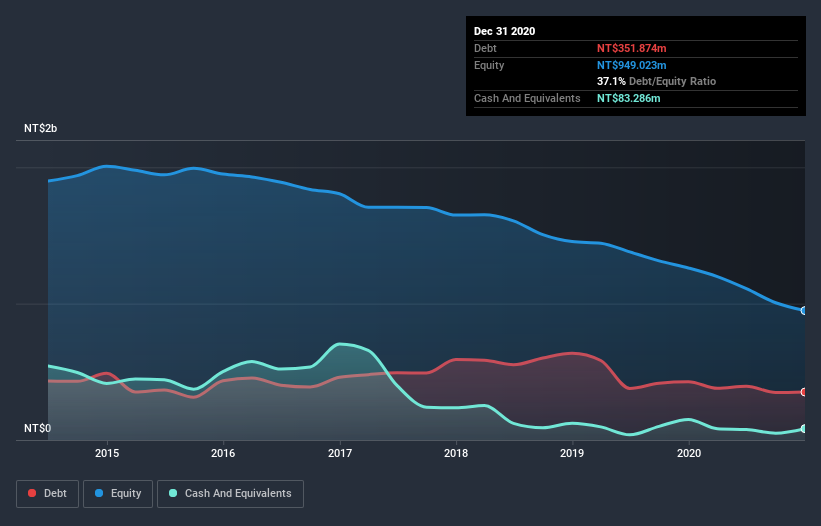The external fund manager backed by Berkshire Hathaway's Charlie Munger, Li Lu, makes no bones about it when he says 'The biggest investment risk is not the volatility of prices, but whether you will suffer a permanent loss of capital.' So it seems the smart money knows that debt - which is usually involved in bankruptcies - is a very important factor, when you assess how risky a company is. We note that Taiwan Calsonic Co., Ltd. (GTSM:4523) does have debt on its balance sheet. But is this debt a concern to shareholders?
When Is Debt Dangerous?
Debt assists a business until the business has trouble paying it off, either with new capital or with free cash flow. Ultimately, if the company can't fulfill its legal obligations to repay debt, shareholders could walk away with nothing. However, a more usual (but still expensive) situation is where a company must dilute shareholders at a cheap share price simply to get debt under control. Having said that, the most common situation is where a company manages its debt reasonably well - and to its own advantage. The first step when considering a company's debt levels is to consider its cash and debt together.
See our latest analysis for Taiwan Calsonic
What Is Taiwan Calsonic's Net Debt?
The image below, which you can click on for greater detail, shows that Taiwan Calsonic had debt of NT$351.9m at the end of December 2020, a reduction from NT$427.1m over a year. However, because it has a cash reserve of NT$83.3m, its net debt is less, at about NT$268.6m.

How Healthy Is Taiwan Calsonic's Balance Sheet?
Zooming in on the latest balance sheet data, we can see that Taiwan Calsonic had liabilities of NT$642.3m due within 12 months and liabilities of NT$10.8m due beyond that. Offsetting these obligations, it had cash of NT$83.3m as well as receivables valued at NT$150.9m due within 12 months. So its liabilities total NT$418.9m more than the combination of its cash and short-term receivables.
While this might seem like a lot, it is not so bad since Taiwan Calsonic has a market capitalization of NT$1.88b, and so it could probably strengthen its balance sheet by raising capital if it needed to. But it's clear that we should definitely closely examine whether it can manage its debt without dilution. The balance sheet is clearly the area to focus on when you are analysing debt. But it is Taiwan Calsonic's earnings that will influence how the balance sheet holds up in the future. So if you're keen to discover more about its earnings, it might be worth checking out this graph of its long term earnings trend.
Over 12 months, Taiwan Calsonic made a loss at the EBIT level, and saw its revenue drop to NT$675m, which is a fall of 30%. To be frank that doesn't bode well.
Caveat Emptor
Not only did Taiwan Calsonic's revenue slip over the last twelve months, but it also produced negative earnings before interest and tax (EBIT). Indeed, it lost a very considerable NT$276m at the EBIT level. Considering that alongside the liabilities mentioned above does not give us much confidence that company should be using so much debt. Quite frankly we think the balance sheet is far from match-fit, although it could be improved with time. Another cause for caution is that is bled NT$44m in negative free cash flow over the last twelve months. So suffice it to say we do consider the stock to be risky. When analysing debt levels, the balance sheet is the obvious place to start. However, not all investment risk resides within the balance sheet - far from it. For example Taiwan Calsonic has 3 warning signs (and 2 which make us uncomfortable) we think you should know about.
If you're interested in investing in businesses that can grow profits without the burden of debt, then check out this free list of growing businesses that have net cash on the balance sheet.
If you’re looking to trade Taiwan Calsonic, open an account with the lowest-cost* platform trusted by professionals, Interactive Brokers. Their clients from over 200 countries and territories trade stocks, options, futures, forex, bonds and funds worldwide from a single integrated account. Promoted
Valuation is complex, but we're here to simplify it.
Discover if Everbrite Technology might be undervalued or overvalued with our detailed analysis, featuring fair value estimates, potential risks, dividends, insider trades, and its financial condition.
Access Free AnalysisThis article by Simply Wall St is general in nature. It does not constitute a recommendation to buy or sell any stock, and does not take account of your objectives, or your financial situation. We aim to bring you long-term focused analysis driven by fundamental data. Note that our analysis may not factor in the latest price-sensitive company announcements or qualitative material. Simply Wall St has no position in any stocks mentioned.
*Interactive Brokers Rated Lowest Cost Broker by StockBrokers.com Annual Online Review 2020
Have feedback on this article? Concerned about the content? Get in touch with us directly. Alternatively, email editorial-team (at) simplywallst.com.
About TPEX:4523
Everbrite Technology
Engages in thermal management, energy technology, and other product controller manufacturing business in Taiwan and internationally.
Acceptable track record with low risk.
Market Insights
Community Narratives



